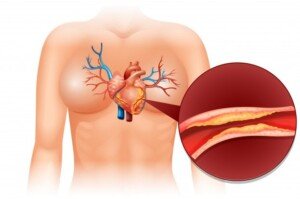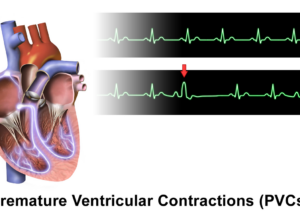
Is there something inherently unique about walking that causes PVCs or heart palpitations?
Yes, there is something that just might be going on only when you walk.
And one of those is anxiety.
“Stress and anxiety are the most common cause of heart palpitations,’ says J. Mark Anderson, MD, DABFM, of Executive Medicine of Texas and who is board certified in family medicine.
Let’s take a look at anxiety as a reason why your palpitations seem to occur only during times of walking.
The term “palpitations” is sometimes used to reference a suddenly racing pulse.
But it more commonly refers to what seems to be a delayed, skipped or extra heartbeat.
And this sensation is also often referred to as PVCs: premature ventricular contractions.
It’s the PVC that makes you think that your heart skipped a beat or had a sudden irregular beat, flutter or thumping.
First, take note of when your walking seems to bring on the PVCs.
“Some people tend to go for long walks or power walks as a way to deal with the stress of the day or to start their morning,” says Dr. Anderson.
“When the walks are coupled with stressful thoughts, like what awaits you at the office, palpitations are more likely to occur.”
Maybe they occur only when you’re walking from the parking lot of your workplace to your office? Hmmm, very interesting!
This sounds like job anxiety — a “program” running in the back of your mind as you subconsciously anticipate stress from your boss, coworkers, clients or workload.

Shutterstock/Creativa Images
Is it only when you walk on a treadmill? Perhaps this is the time that your mind wanders, venturing into stressful territory, or maybe there’s an influx of intrusive negative thoughts.
Maybe while you’re walking for fitness, you just can’t help play out in your mind some unnerving scenarios, such as confronting a hostile family member about the money they owe you.
Maybe it’s a time that you usually re-enact scenarios that have already happened—that you wished you had handled differently and you’re mad at yourself for not.
Stress and anxiety can definitely trigger palpitations — and maybe those treadmill walks, or walking in the nearby park or walking your dog, are a conditioned stimulus for feeling stressed.
Have you noticed that, despite walking “causing” your PVCs, you don’t get PVCs or palpitations while you’re strength training at the gym or engaged in other activity that’s more intense and distracting than mere walking?
This is a tip-off that the PVCs are being generated by anxiety — that’s triggered by walking.
However, here’s a fair question:
Is there something inherent in the actual biomechanics of walking that causes palpitations?
“These can be worsened by the use of caffeine,” begins Dr. Anderson.
“This is because your heart rate tends to speed up in these circumstances.
“The same is true when walking, especially power walking. If no other symptoms are present, it will normalize when you sit down or relax.
“Palpitations that are accompanied with dizziness, fatigue or other symptoms should be evaluated by a healthcare provider.”
More times than not, though, it’s just that walking sometimes encourages thoughts to wander and imaginations to get a little wild, and the walking may also be towards a source of stress, such as your workplace from the parking lot, or the mall where you face large shopping tasks.
The Key Questions
• Whenever you have palpitations, are you always walking?
• They never occur during heavier physical exertion?
• Never during gardening (which can be very relaxing)?
• Never during yoga, swimming or strength training?
• And…it’s only sometimes during walking, not always?
Answering “yes” to these questions points towards anxiety as a cause.
You may also want to ask yourself what you eat or drink shortly before going on fitness walks. As Dr. Anderson pointed out, caffeine can trigger palpitations.

Shutterstock/NOBUHIRO ASADA
Another Big Question
Have you been diagnosed with heart disease? If so, the presence of PVCs or palpitations becomes more significant.
It’s advisable that you get a full exam by a cardiologist to see if you might be at risk for coronary heart disease.

Source: Freepik.com/brgfx
The doctor may order a cardiac stress test and echocardiogram. PVCs with coronary heart disease are not a good combination.
That said, you should also ask yourself if walking has become a conditioned stimulus for palpitations because every time you walk for an extended period, you start worrying about PVCs!
Maybe you had a few PVCs while walking, and that single incident has now thrown you for a loop? Anxiety triggers hormones that can make the heart jump or flutter.
PVCs can have a medical cause and also be caused by liquor, medications and magnesium/potassium deficiency.
But again, if you have them ONLY when walking, this points away from a pathological or pharmaceutical cause.









































